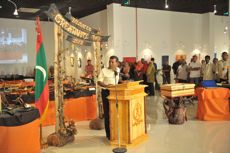Ferry services in Raa Atoll are helping the Rasgetheem community cope with dwindling medical staff.
With the island’s only doctor on a four-day leave, medical services beyond simple blood pressure tests have been suspended. Meanwhile, the clinic’s nurse remains on duty to provide basic services to Rasgetheem’s 952 residents.
Although the lack of a doctor would seem insupportable for any community, a Rasgetheem council member said new ferry services have accommodated the inconvenience.
“Since the ferry opened people are choosing to go to Ungoofaru, it’s only one-and-a-half hours by ferry”, she pointed out.
The council member said a second doctor had been requested, however the council understood that none were available.
Of Raa Atoll’s 15 inhabited islands, none have more than one doctor and there is no back-up physician to fill in when doctors go on leave. In most cases, island doctors are limited by skill set and technology.
Ungoofaru Regional Hospital Assistant Manager Hussain Shiham said medical staffing was one of the atoll’s biggest concerns.
“Staffing here is very weak, especially doctors. Right now Raa atoll, Noonu atoll and Baa atoll don’t have gynecologists. Raa atoll doesn’t have a dentist or an orthopedist. We have applied for over 19 medical personnel, but the medical council hasn’t approved any,” said Shiham.
Shiham explained that the regional hospital has requested staff, even submitting applications for positions received from medical professionals in Italy, Russia and the Ukraine. “But the medical council won’t accept Russian graduates because their school system isn’t registered internationally,” he said.
When asked about the Atoll’s relationship with the medical council, Shiham said he was unclear about the election process and supposed that council members had political motivations.
Assistant Director of the Ministry of Health and Family, Fathimath Lamiya, said new hires had been delayed by flaws in the recruitment process which exposed communities to medical malpractice, but corrected that the changes had not created the current staff shortage.
Previously, she explained, members of the health sector assumed that approval to recruit staff members was equivalent to approval to practice medicine.
“The councils are mandated to regulate health professionals and ensure that they meet certain standards,” Lamiya said. “In most countries you have to be registered with a board or council to certify that you are able to practice. Many weren’t, but now they are being registered.”
New regulations under the Health Ministry aim at reducing the time, cost and risk of hiring foreign medical staff.
“All candidates will submit qualifications to get approval, but now they can use photocopies rather than original documents,” Lamiya said, adding that the previous system requiring original documents involved candidates coming into the Maldives and, if not approved, receiving a paid flight home at the Maldivian employer’s expense.
“Now, candidates will get their recruitment approval before they arrive, the Human Resources Ministry will require that approval to issue a visa, and upon arrival they can register with their original documents in the island councils,” Lamiya said.
She observed that the shortage of medical staff was a concern, but hoped the new process would ensure that good doctors are hired.
Meanwhile, Shiham said, health professionals on Raa Atoll make ends meet.
“Ferry rates have dropped significantly, so people are coming more and more to the regional hospital,” he said, acknowledging that the service has boosted cooperative efforts among the islands.
“If a person has a serious health condition [when the doctor is away], then people will get a launch to take him to a nearby island. The nearest is only three minutes away. A nurse is usually in a health center nearby, and I think we can provide services”, he said.
For services beyond the capacity of the regional hospital, Shiham said a four hour ferry to Male’ was available for Rf 580 (US$35).

